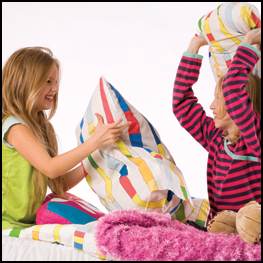
Most kids are potty trained and can consistently wake up dry in the morning by age four. But if your child isn’t among them, you’re not alone. Over 5 million kids continue to wet the bed after age six, according to the National Kidney Foundation (NKF). Bedwetting, medically known as “nocturnal enuresis”, is so common among school-age kids that it’s not typically a cause for concern.
“Bedwetting is physiologic. We don’t know the underlying cause,” says Jennifer Trachtenberg, M.D., and author of The Smart Parent’s Guide. The inside story: After urine is produced by the kidneys, it travels through ureters (muscular tubes) to the bladder, where it’s stored. When the bladder is full, nerve signals are sent to the brain that ultimately tell the bladder to stay closed or to open sphincters, valves akin to an aperture of a camera, which allow urine to flow out. “Kids who wet the bed don’t have the ability to hold urine until morning or wake themselves up to use the bathroom during the night,” Dr. Trachtenberg says. “There’s a disconnect between the brain and the bladder.”
Bedwetting tends to be more common in boys. It also runs in families. 45 per cent of kids who wet the bed have one parent who wet the bed as a child. Fortunately, most children outgrow bedwetting over time. Only 1 to 2 out of every 100 kids still wets the bed by age 15, according to the NKF. One caveat: If your child has been dry for years, then starts wetting the bed or suddenly experiences peeing or pooping problems during the day, bring them to your pediatrician to rule out a medical issue, which, fortunately, is rare.
A child who has been dry for years but then starts wetting the bed may be responding to a change in their environment, such as moving to a new home, the arrival of a baby brother or sister, the loss of a family member or divorce. Counseling with a therapist trained in working with children can often help resolve issues that linger and help put a stop to bedwetting that has emotional underpinnings. Otherwise, just let nature take its course. “As pediatricians, we do a lot of watching, waiting,” says Dr. Trachtenberg.
Go with the flow – Meanwhile, as frustrating as bedwetting can be, don’t make a big deal out of it. Kids can feel embarrassed, ashamed and anxious about their bedwetting episodes. Sleepovers, a trip to Grandma’s house, staying at hotels or going to summer camp can be especially worrisome. These tactics can save your sanity during the bedwetting stage with your child’s self-esteem intact while curtailing laundry duty and late-night cleanup.
Stay positive – Kids want to stay dry through the night. If your child isn’t there yet, tell them they’ll be able to soon. Your encouragement will boost their confidence and put them at ease. They’ll take their cues from you. If you or other family members wet the bed growing up, mention it, and that lots of kids have the same problem. Never punish your child for wetting the bed. Remind them and yourself that it’s not their fault.
Visit the potty before bed – Have your child take one last trip to the bathroom before climbing under the covers. Limit liquids at bedtime too. “If your child is thirsty before bed, give him an ice chip instead of water or other fluids,” says Dr. Trachtenberg.
Don’t wake up your child – Some pediatricians recommend waking kids up periodically during the night to use the bathroom as a pre-emptive strike, but Dr. Trachtenberg isn’t a fan of this timing technique. “It doesn’t help train children stay dry at night,” she says. It disrupts everyone’s sleep too. To be able to function well the next day, a restful night’s sleep is important for kids and parents.
Bedwetting alarms – special alarm clocks and other sensor products that sound when a child wets a few drops – are available but they also interfere with your child’s sleep and don’t cure the problem. Think twice before investing in them.
Get equipped – Bedwetting products are available that can give your washing machine a break, protect your child’s mattress and give them confidence to do overnights at Grandma’s house and participate in sleepovers. First thing, invest in a waterproof mattress cover. Then, consider disposable, absorbent underwear. It can be a discreet lifesaver that can give kids a feeling of control over the situation that often makes them feel helpless. If your child doesn’t want to wear disposable undies, absorbable mattress protectors are a new alternative. The soft, peel-and-stick product goes over the fitted bottom sheet and is designed to draw fluid in quickly. Bed mats are easy enough for kids to use themselves without getting mom or dad involved. Cleanup means just pulling a wet mat off the bed and tossing it in the trash.
Waterproof sleeping bag liners and sleeping bags with absorbent material are also available online for summer camp and camping trips. You might also want to alert your child’s camp counselors. If your child is concerned about accidents at camp, prescription medication is available to decrease urine production at night. The effects of the drug may only last a short time and once kids are off the medication, bedwetting usually returns. Still, it may be worth talking to your child’s pediatrician about this stop-gap measure.
Sandra is an award-winning writer who delivers expert advice and the latest developments in health, nutrition, parenting and consumer issues. Her most recent book is Save a Bundle: 50+ Ways to Save Big on Baby Gear.
Calgary’s Child Magazine © 2024 Calgary’s Child